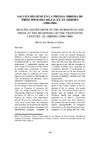Please use this identifier to cite or link to this item:
https://accedacris.ulpgc.es/handle/10553/75029
| Title: | Salud e higiene en la prensa obrera de principios del Siglo XX: El Obrero (1900-1906) | Other Titles: | Health and hygiene in the working-class press at the beginning to the twentieth century: El Obrero (1900-1906) | Authors: | Betancor Gómez, María Josefa | UNESCO Clasification: | 550617 Historia de la medicina 630905 Clases sociales |
Keywords: | Salud Higiene Clase obrera Enfermedad Herencia, et al |
Issue Date: | 2012 | Publisher: | Cabildo Insular de Gran Canaria | Conference: | XIX Coloquio de Historia Canario-Americana | Abstract: | El higienismo se encontraba al alza en las últimas décadas del siglo XIX. Médicos y teóricos sociales burgueses temían que el general incremento de la morbimortalidad y las enfermedades infecciosas y carenciales pusiera en serio riesgo la existencia de una fuerza de trabajo sana, acelerando el avance del socialismo. Se creó un circuito continuo entre los dominios de lo biológico y de lo social. La enfermedad era vista en términos de herencia, “leyes naturales” y degeneración. El movimiento obrero estuvo implicado en esos debates. Este movimiento, incipiente en Canarias al comienzo del siglo XX, estaba liderado por la AOC (Asociación Obrera de Canarias) y su periódico, El Obrero. La salud y la higiene del obrero eran importantes para El Obrero. El alcoholismo se convirtió en su bestia negra. Sin embargo, este periódico no desarrolló un discurso que se pueda distinguir claramente del paternalismo burgués, reflejando la heterogeneidad del grupo y la amplia influencia del lenguaje político del Regeneracionismo. Hygienism was on the rise in the last decades of the XIX century. Bourgeois medical men and social theorists feared that the general increase of morbid mortality and infectious and deficiency diseases put at severe risk the existence of a healthy working force, speeding up socialism’s advance. A continuous circuit between the social and biological domains was created. Disease was seen in terms of heredity, “natural laws” and degeneration.Working-class movement was involved in those debates. This movement, incipient in the Canary Islands at the beginning of the XX century, was leaded by the AOC (Asociación Obrera de Canarias) and its journal El Obrero. Workers’ health and hygiene were important for El Obrero. Alcoholism became its more bête noir. However, this journal did not develop a discourse clearly distinguishable of bourgeois paternalism, reflecting the political heterogeneity of the group and the widespread influence of the political language of the “Regeneracionismo”. |
URI: | https://accedacris.ulpgc.es/handle/10553/75029 | ISBN: | 978-84-8103-650-3 | ISSN: | 2386-6837 | Source: | XIX Coloquio de Historia Canario-Americana (2010), p. 360-376 | URL: | http://dialnet.unirioja.es/servlet/articulo?codigo=7228559 |
| Appears in Collections: | Actas de congresos |
Page view(s)
236
checked on Feb 17, 2024
Download(s)
66
checked on Feb 17, 2024
Google ScholarTM
Check
Altmetric
Share
Export metadata
Items in accedaCRIS are protected by copyright, with all rights reserved, unless otherwise indicated.
